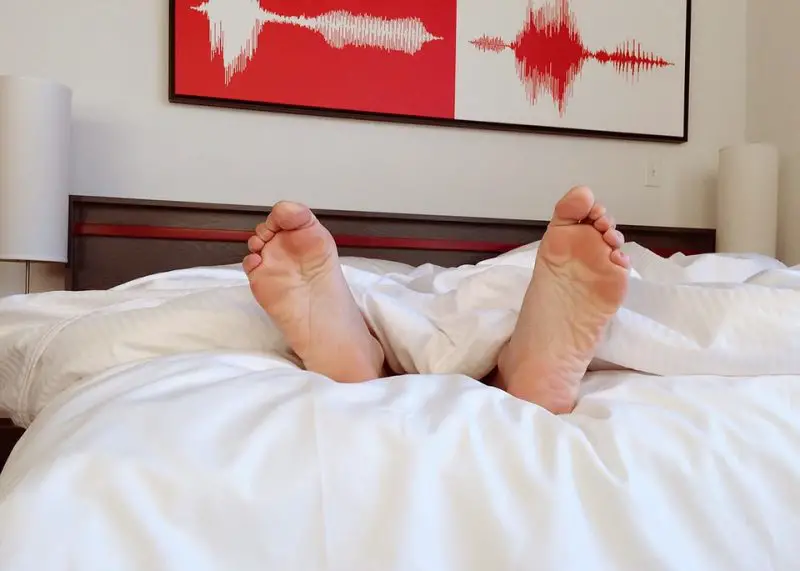What does being held down in a dream mean?
What does being held down in a dream mean?.
With sleep paralysis, you have the feeling that you are awake, but you cannot move your body. Sleep paralysis (also known as sleep analysis) occurs when a person is between the phases of vigilance and sleep. During this transition phase, you cannot move or speak for a few seconds to a few minutes.
Some people will also feel pressure or experience a feeling of suffocation. Researchers have shown that in most cases, sleep paralysis is a sign that the body is not going smoothly through the sleep phases. It is rare for sleep paralysis to be linked to deep, underlying psychiatric problems. However, sleep paralysis often occurs in people who suffer from a narcolepsy sleep disorder.
When does sleep paralysis occur?
There are two times when sleep paralysis can occur. The moment you fall asleep (falling asleep), this is called hypnagogic or prodromal sleep paralysis. And when you wake up (awakening), it’s called hypnopompic or post-formal sleep paralysis.
What happens during sleep paralysis?
The moment you fall asleep, the body will slowly relax. You usually lose your consciousness. Therefore you do not notice this change. But when you do have this consciousness, you will find that you cannot move or speak.
During sleep, the body will switch between REM sleep (Rapid Eye Movement) and NREM sleep (Non-Rapid Eye Movement). A full cycle of REM and NREM sleep lasts approximately ninety minutes. First, the NREM phase will take place, which takes up about three-quarters of the full sleep time. Your body will relax and recover during the NREM phase. The REM phase starts at the end of NREM sleep. Your eyes will move quickly, and you will start dreaming, but the rest of your body will remain very relaxed. The muscles are switched off during the REM phase. When you come to consciousness before the REM phase has finished, you may notice that you cannot move or speak.
Who suffers from sleep paralysis?
Up to 25 percent of the population can suffer from sleep paralysis. This common condition is often diagnosed in the teenage years. But both men and women of any age can suffer from it. Other factors associated with sleep paralysis are:
- Lack of sleep
- Changing sleep schedule
- Psychological disorders such as stress or bipolar disorder
- Sleep on the back
- Other sleeping problems including narcolepsy or leg cramps
- Use of specific medication such as ADHD medication
- Drug use
How is sleep paralysis diagnosed?
If you notice that you cannot move or speak for a period of a few seconds to a few minutes while falling asleep or waking up, you are likely to have an occasional sleep analysis. Usually, no treatment is required for this.
Ask your doctor if you experience the following problems:
- You feel fear about your symptoms
- The symptoms make you very tired during the day
- The signs keep you awake at night
The doctor can then ask for the following information about your sleeping behavior through the next steps:
- Ask what the symptoms are precisely and have a sleep diary kept for a period of a few weeks
- Ask about your health in the past, including sleep disorders or family members with sleep disorders
- Referral to a sleep specialist for further investigation
- Performing sleep examinations
How is sleep paralysis treated?
For most people, no treatment is required for sleep paralysis. It is sometimes possible to address underlying problems such as narcolepsy, when you suffer from anxiety or cannot sleep well. These are some conventional treatments:
- Improve sleep hygiene by ensuring that you sleep six to eight hours a night.
- Use of antidepressants when prescribed to regulate the sleep cycle.
- Treating psychological problems
- Treatment of other sleep disorders
What can I do about sleep paralysis?
There is no need to be afraid of monsters in the night or aliens that come to get you. If you have sleep paralysis from time to time, you can take various steps at home to deal with it. First of all, make sure you get enough sleep. Try to limit stress and tension in your daily life, especially before you go to sleep. Try a different sleeping position when you are used to sleeping on your back. And contact your doctor if you regularly do not get a good night’s sleep due to sleep paralysis.
References:

